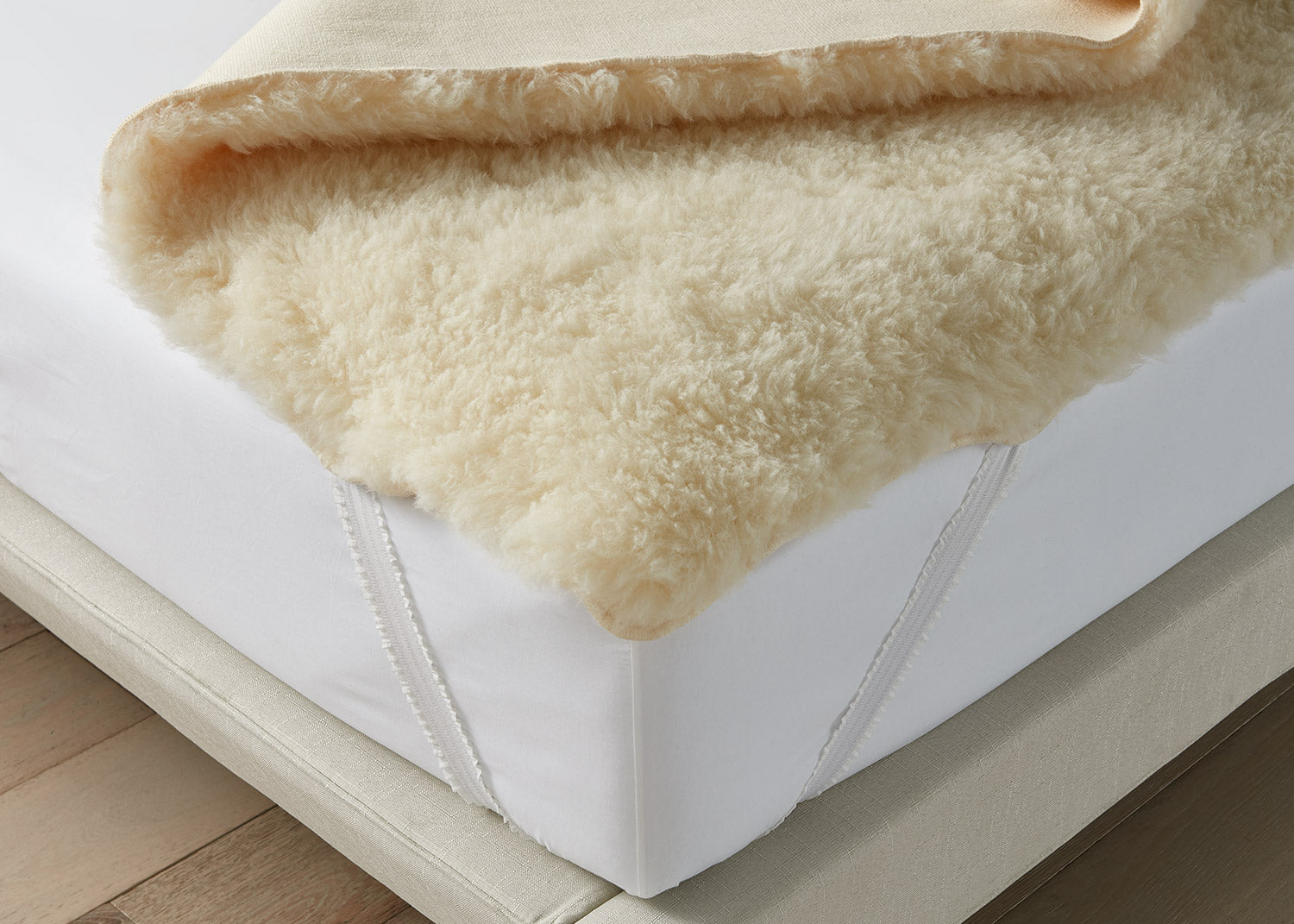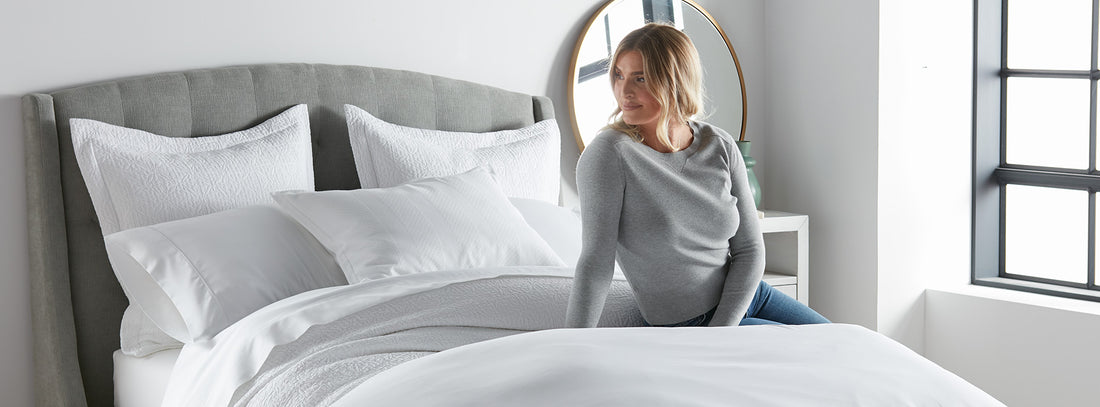Do you need a mattress protector? If this question is on your mind as you shop for bedding essentials, you're not alone. Many people wonder about the necessity and benefits of mattress protectors. Don’t worry, we’ve got you covered. From waterproof to organic options, the choices are plentiful and can suit various needs. To help you navigate through these options and select the best one, we’ve compiled the ultimate guide to picking the perfect mattress protector. Here’s everything you need to know to make an informed decision for your bedding comfort.
What Exactly is a Mattress Protector?
Mattress protectors are a cost-effective way to protect and extend the life of your mattress. They shield against dirt, debris, sweat, and liquids. They can also defend your bed against bed bugs, dust mites, and allergens — ideal for sleepers whose allergies keep them up at night. Plus, they’re generally much easier to clean than your actual mattress.

Wool Mattress Topper

Down Alternative Mattress Topper
Coverage Type
Before buying a mattress protector, determine which coverage type is best for your household. The three main varieties include the following:
- Encasement mattress protectors snugly wrap around the whole mattress and usually close via a zipper. These mattress protectors are considered the best for people with skin sensitivities since their full coverage keeps out dust mites and allergens.
- Elastic strap mattress protectors, on the other hand, only cover the top of your mattress with stretchy straps that keep everything in place. This coverage type may work best for people who have trouble finding a protector that fits their bed, as many have deep corners for a broader range of mattress types.
- Fitted mattress protectors also cover your mattress on the top but tuck around the sides like a fitted sheet. Both elastic strap protectors and fitted mattress protectors work best if you only want to shield your sleep surface from spills, accidents, and sweat (instead of the entire bed).
Materials Mattress protectors are made of a variety of materials. Which type you choose will depend on your personal preference. Common materials include the following:
- Cotton
- Polyester
- Down
- Vinyl
- Polyurethane
- Latex
- Spandex
- Wool

Factors to Consider When Choosing a Mattress Protector
Fabric
The fabric of your mattress protector should be based on your needs and preferences. For example, protectors made of wool are generally more insulating, while polyester ones are more affordable. For sustainability, opt for materials like bamboo. And if you’d like a soft, breathable option, choose a mattress protector made from 100% cotton, offering high-end quality for your ultimate comfort.
Cooling Properties
If you run hot when you sleep or live in a warm climate, consider looking into mattress protectors with cooling properties. A cooling mattress protector can passively regulate your temperature by offering breathable materials like organic cotton and wool. Others actively prevent you from getting hot by drawing heat away from your body with infused gel. Still, some mattress protectors cool your sleep surface with special cooling properties like phase change material and eucalyptus fiber.
Waterproofing
A waterproof mattress protector is great for households with pets, children prone to accidents, sleepers who sweat a lot, or anyone who likes to eat or drink in bed. Materials like vinyl and polyurethane plastic are waterproof but not the most breathable or the quietest.


Down Alternative Mattress Topper

Down Alternative Pillows
Hypoallergenic Properties
If you struggle with allergies, choose an encasement mattress protector with hypoallergenic properties to help block out dust mites and allergens.
Hypoallergenic covers come in a vast array of materials, like cotton, bamboo, and even plastic and vinyl. Organic mattress covers made of fabrics like eucalyptus-based Tencel are also naturally hypoallergenic.
Noise
Are you a sound-sensitive sleeper? Then you’ll want to pay attention to the materials and construction of your mattress protector. While many are quiet and won’t disrupt your sleep, others (like waterproof protectors with polyurethane membranes or vinyl material) might make rustling or squeaking sounds that could keep you awake.
Care and Maintenance
Most mattress protectors can be washed at home, but you’ll still want to double-check if they can be machine-washed and tumble-dried. Quick and easy care is especially convenient for households who need to clean the protector (think: in hot climates or families with children).
Yes, You Need a Mattress Protector
Mattress protectors are a smart way to keep your mattress clean, dry, and comfortable. They also help keep sleepers cool or warm throughout the night and shield them against allergens for better sleep. While mattress protectors come in three main coverage styles (encasement, fitted, and elastic strap), there are many different varieties on the market to suit your needs and preferences — from waterproof and hypoallergenic to sustainable and organic.
At Peacock Alley, we offer quality bedding you can feel. We believe that true luxury bedding is liveable, washable, and endures the test of time. Our products are also surprisingly easy to care for. When it’s time to pick out your next mattress protector or topper, let us be your resource for all things bedding and bath.
Frequently Asked Questions (FAQ)
Q: What are the benefits of using a mattress protector? Mattress protectors keep your mattress clean by shielding it against sweat, dirt, allergens, dust mites, bacteria, and even bed bugs. They’re also a cost-effective way of extending the life of your mattress.Q: What is the difference between waterproof and organic mattress protectors? Waterproof mattress protectors typically have a thin membrane made from vinyl or polyester to block out moisture. Organic mattress protectors, on the other hand, are made with certified organic materials like cotton and wool instead of manmade fabric. Organic mattress protectors are also more breathable than waterproof protectors.
Q: How do I clean and maintain my mattress protector? Most mattress protectors can be machine washed and tumble-dried. Usually, washing in cold water and with mild detergent is recommended. You’ll also want to use the gentle wash cycle and tumble dry on low.
Q: Will using a mattress protector make my bed less comfortable? A mattress protector shouldn’t make your bed less comfortable, especially since many offer features like cooling properties to aid in better sleep. However, protectors may not provide as much cushioning as you’d like. While there are padded protectors, you might want to consider a mattress topper or pad if you want more cushioning.























